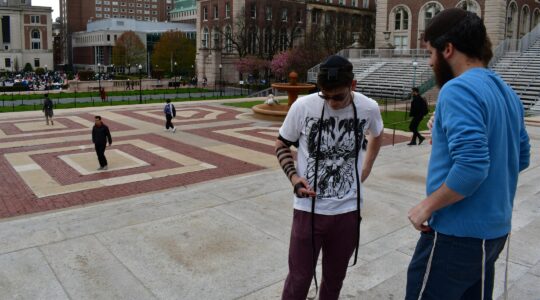CLEVELAND (JTA) – Hoping to prove that reports of Hillary Clinton’s demise have been greatly exaggerated, several of the New York senator’s top Jewish supporters say her fund-raising efforts are proceeding apace and the campaign remains energized heading into next week’s primaries.
By the candidate’s own admission, the contests on March 4 in Texas and Ohio are must-wins for Clinton, who has seen U.S. Sen. Barack Obama (D-Ill.) rack up 11 straight victories and seize a definitive advantage in momentum and party delegates.
But after a week in which Clinton was buffeted by news reports that her campaign finances were imperiled by spending that had veered out of control, top fund-raisers were eager to accentuate the positive.
“Hillary is regaining her momentum in Texas,” said Houston attorney Arthur Schechter, who served as ambassador to Bermuda under President Bill Clinton and is a major supporter of the former first lady.
The former president spoke at a fund-raising event last week that Schechter said had a “full house” and raised “a bunch of money.”
“We’re just very optimistic,” Shechter said. “We’ve been getting really great turnouts at campaign events and people are very excited, energized.”
The New York Times reported last week that revelations of millions spent on high-priced consultants, and thousands more on luxury hotel suites and pizza runs, had led Clinton donors to question whether campaign expenditures of more than $100 million had been worth it.
Part of the trouble, the Times reported, was that Clinton had sought support from donors who wrote checks early for the maximum amount allowed by law, $4,600 – a concern echoed by Schechter.
“The problem,” Schechter said, “is a lot of our people have maxed out under the new federal laws.”
In Boston, Clinton held two fund-raisers on Sunday that collectively drew about 1,500 people, according to a top Clinton supporter, Steve Grossman, a former chairman of the Democratic National Committee and ex-president of the American Israel Public Affairs Committee.
“We could not have fit another person in either venue,” Grossman told JTA. “The room was packed to the gills.”
Grossman also dismissed suggestions that Clinton’s fund raising is lagging over concerns that Obama has pulled definitively into the lead. Tickets to the event sold easily, he said, and unsolicited offers of help were pouring in, particularly from women.
“People realize that it’s a defining moment in the campaign and these are states she’s got to win,” Grossman said, referring to Texas and Ohio. “And if the money is a key ingredient to television advertising and organizing, then this is the time you make the investment to bring the momentum back Hillary’s way, which is the goal.”
Meanwhile, Clinton and her surrogates stepped up their direct attacks on Obama. Newsweek reported last week that the Clinton campaign has been circulating materials attacking Obama’s pro-Israel credentials, and quoted a senior Clinton adviser, Ann Lewis, as falsely naming Zbigniew Brzezinski as Obama’s “chief foreign policy adviser.”
Brzezinski, a former adviser to President Jimmy Carter, is an unpopular figure in pro-Israel circles for his support of a controversial book about the supposed power of the “Israel lobby.” Brzezinski is one of a number of foreign policy intellectuals who have informally advised the Obama campaign.
On Tuesday, a group of Ohio Jewish leaders defended Obama in a letter to Clinton. The group condemned the “baseless attacks” that had emanated from the Clinton camp and described Obama as “a strong friend of Israel.”
Other Clinton supporters steered clear of the Israel issue, taking aim at Obama’s relative lack of experience compared to Clinton. Schechter used a business analogy to highlight the uncertainly surrounding an Obama presidency.
Voting for Clinton is “like buying a blue-chip stock – you know what you’re getting and you know it’s secure,” Shechter said. “Obama is like an IPO. He may be Google, or maybe not.”
Martin Indyk, a former top Clinton administration Middle East envoy and surrogate for Hillary Clinton, was in Ohio and Texas delivered a similar message to Jewish communities there: It’s the naivete, stupid.
Indyk, addressing about 150 people Monday at the cavernous Park Synagogue East in suburban Cleveland, said choosing between Clinton and Obama in the critical presidential primaries next Tuesday was like picking a baby sitter: Look at the resume, yes, but also try to find out how the baby sitter would act in an emergency.
“This is more about instinct and judgment than it is about experience,” said Indyk, now a fellow at the Brookings Institute in Washington.
“Any person in his or her first year of office is going to be tried with a whole set of crises,” he said, citing the likelihood that Iran will cross the nuclear weapons threshold in the next presidency.
Indyk said pro-Israel voters should back the candidate who “understands how narrow are Israel’s margins of security” and that “Israel deserves the benefit of the doubt.”
That candidate is Clinton, he said. Without mentioning Obama by name, Indyk made it clear that he believes the Illinois senator lacks Clinton’s sharp-eyed perspective.
The Australia-raised Indyk described what he said was a “wonderful” American naivete, but said its flip side was a tendency to assume that others want to be like Americans. That tendency described Bill Clinton’s failed attempt to shepherd forward Israeli-Palestinian peace, he said, as well as the morass in Iraq created by President Bush’s plans for democratizing the region.
“The next president is not going to have the luxury of indulging this naive instinct,” said Indyk, who plans to make similar pitches to Jewish audiences in Cincinnati and Houston.
Pressed during question time, Indyk explicitly said that he thought Obama’s policies were naive. He pointed to Obama’s pledge to meet with the heads of rogue states, including Iran, during his first year in office, while Clinton planned first to build an international alliance to isolate Iran.
Indyk also strongly denounced a campaign to depict Obama advisers as anti-Israel, saying he thought that some of the people identified as advising Obama on the Middle East were wrong and naive – but not anti-Israel.
Word originally was that Alan Dershowitz, the Harvard legal scholar and Jewish crowd favorite, would appear on Clinton’s behalf, but he was committed to solidarity appearances on behalf of Sderot, the southern Israeli town beleaguered by Palestinian rocket attacks.
The appearance by a Clinton surrogate was a last-minute affair organized when Clinton backers in the state learned that Obama’s campaign was conducting a Jewish outreach blitz.
U.S. Rep. Robert Wexler (D-Fla.) attracted a crowd of 500 to an event in Cleveland on Sunday. That morning, Obama himself had a closed meeting with 150 of the city’s Jewish leaders.
Clinton loyalists who attended the Indyk talk said they were not overly concerned that Wexler attracted a larger and younger crowd. Obama, a relative newcomer to national politics and the subject of a mass e-mail campaign targeting his pro-Israel credentials, had more to explain, they said.
“Less people felt the need to come and hear about Hillary because they already know about Hillary,” said Renee Pinsky, who drove in with two friends from Akron to pick up pro-Clinton pointers from Indyk that they will use on their undecided friends.
Polls show Clinton still ahead by about 10 percentage points in Ohio, considered a natural for her because of its working-class white base hit hard by unemployment and the mortgage crisis. Her lead, however, has narrowed drastically in recent weeks.
Organizers of the evening urged Clinton followers to reach out to their friends and not be lulled by Clinton’s lead.
“I would urge you to speak about her,” Leslie Dunn said.
Dunn underscored the gender/age gap that frames Clinton’s struggle across the country and in the Jewish community, inviting the participants to a party at Pickwick and Frolic, a downtown drinking hole, timed for Tuesday’s Clinton-Obama debate at Cleveland State University.
“It’s very hip,” she told the crowd, “but I think we’ll be comfortable, too.”





